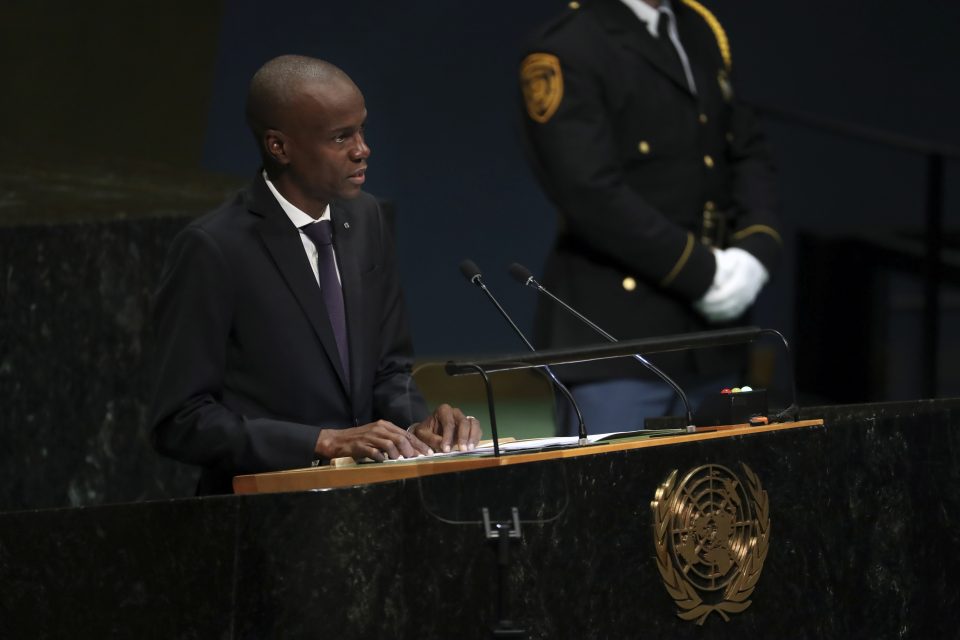Haitian authorities said Sunday they were holding a Florida-based doctor they believed had aspirations of seizing power in his native country in the assassination of President Jovenel Moïse.
To date, some two dozen people have been arrested in the killing, but Sunday, Haitian officials described Dr. Christian Emmanuel Sanon, 63, as a central figure in a case.
“He arrived by private plane in June with political objectives and contacted a private security firm to recruit the people who committed this act,” said the national police chief, Léon Charles.
During a raid at his home, authorities said, police found a DEA cap — the team of hitmen who assaulted Moïse’s home falsely identified themselves as Drug Enforcement Administration agents — six holsters, about 20 boxes of bullets, 24 unused shooting targets, and four license plates from the Dominican Republic.
Sanon is the third Haitian-born suspect with U.S. ties known to be arrested. Other suspects include 18 Colombian men, most of them former soldiers.
Authorities identified the firm as a Venezuelan security company based in the United States called CTU.
News of the arrest came hours after the United States announced that it was sending a team of investigators to Haiti.
U.S. officials signaled that they remain reluctant to provide military forces to Haiti to help secure order, but they said they were sending a team of investigators to help look into last week’s assassination, which has left the country teetering.
A team of FBI agents and Department of Homeland Security officials will assist the Haitian government’s investigation into the killing on Wednesday of Moïse, said John Kirby, the Pentagon press secretary.
With conditions in Haiti grim, the country’s interim prime minister, Claude Joseph, has asked the United States to send troops. But with U.S. forces only newly extricated from the long war in Afghanistan, the Biden administration has shown no enthusiasm for the idea.
It is not just a matter of the United States being disinclined to send troops abroad any time soon.
The request came from a man who has claimed to be in control of Haiti despite questions about his authority. It is not even clear if Joseph is the rightful interim prime minister, since another was poised to take over when Moïse was assassinated. The two men now appear to be vying for power.
Beyond that, given their long and unhappy experience at the hands of outside powers, including a 20-year American occupation, many Haitians are opposed to a U.S. intervention.
So there are many reasons for U.S. officials to tread lightly.
“I think that’s really where our energies are best applied right now: helping them get their arms around investigating this incident and figuring out who’s culpable, who’s responsible, and how best to hold them accountable going forward,” Kirby said on Fox News Sunday.
The U.S. investigative team was reported to have arrived Sunday morning in the Haitian capital, Port-au-Prince.
For several days, U.S. government analysts have said they were concerned that the Haitian police appeared to be struggling with the investigation into how a team of hitmen had been able to penetrate a Haitian security perimeter and kill Moïse at his home.
But U.S. officials insisted that the team would not take over the investigation or take a direct part in it. And they said that the team was made up only of investigative experts and that it would not get involved in security matters or in internal politics.
Many of the suspects being held in the case are Colombian citizens, most ex-military members, and two were known to be Americans.
News that the United States was sending investigators came as Haitians reeled over the emergence of photos from the assassination. The grisly images spun quickly around social media and were accompanied by unfounded conjecture about the moments before the president’s death.
Some claimed the photos showed that Moïse had been tortured. Forensics experts who were asked to review the images for The New York Times said that did not appear to be the case.
Concerned that the photos would further destabilize Haiti, some people urged their countrymen not to circulate them.
“Haitians are better than that,” one journalist, Nancy Roc, declared on Twitter.
Others wondered if destabilization was the point and if the photos had been made public to advance political agendas.
“Lacking chaos, they are creating it,” said Danta Bien-Aimé, a nurse and former Fulbright scholar.
U.S. officials say they do not believe the situation in Haiti is getting out of hand, suggesting that reports of chaos are overstated. While many businesses remain closed, the country is relatively calm and there is no widespread rioting, according to U.S. officials.
Sending troops to Haiti, some U.S. officials believe, would most likely make the situation worse.
U.S. government analysts continue to believe the assassination plot was hatched from within Haiti.
Chris Wallace of Fox News pressed Kirby on whether conditions in Haiti were a matter of national security. Kirby said the government was watching the situation closely.
“I don’t know that we’re at a point now where we can say definitively that our national security is being put at risk by what’s happening there,” he said. “But clearly we value our Haitian partners. We value stability and security in that country.”
The Pentagon was caught off guard by the Haitian request for troops Friday and quickly struck an unreceptive tone. Kirby’s comments Sunday suggested that the thinking has not shifted since then — and if anything, has hardened.
This article originally appeared in The New York Times.


